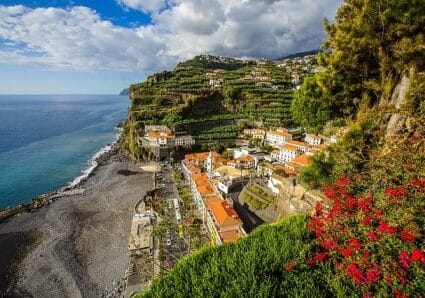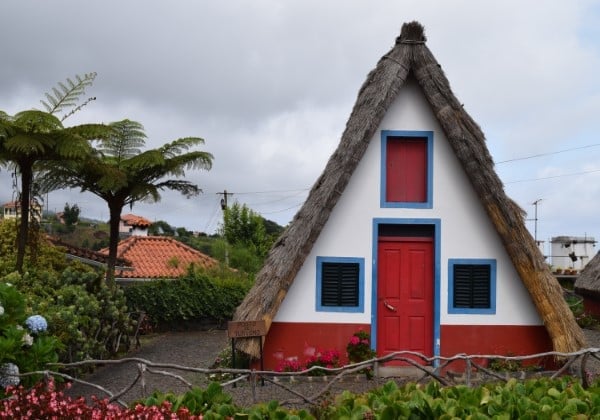Updated: December 10, 2025
An island of paradise in the center of the Atlantic with an outstanding climate, captivating landscapes, and a thriving real estate market, Madeira has caught the eye of many investors and foreign buyers in recent years. Buying property in Madeira provides a dynamic, affordable market that can yield strong returns on your investment and high capital appreciation.
In this article, we’ll provide you with everything that you need to know about the archipelago and the Madeira real estate market, while also getting under the skin of what life is really like in Madeira.
You’ll also learn more about:
Overview of Madeira's Real Estate Market
 Madeira’s real estate market has gained increasing international attention in recent years, driven by the island’s unique blend of natural beauty, mild climate, and growing reputation as both a lifestyle and investment destination.
Madeira’s real estate market has gained increasing international attention in recent years, driven by the island’s unique blend of natural beauty, mild climate, and growing reputation as both a lifestyle and investment destination.
Unlike mainland hotspots such as Lisbon or the Algarve, Madeira is one of the best places to buy real estate in Portugal as it offers a slower pace of life, attracting retirees, digital nomads, and lifestyle buyers seeking tranquility without sacrificing connectivity.
The capital, Funchal, leads the market, with modern apartments and luxury villas in hillside locations offering panoramic ocean views. Prices here are generally more affordable than Lisbon or Cascais, though demand is rising steadily as remote work and tourism expand the island’s appeal.
Investment opportunities in Madeira are diverse, ranging from holiday rentals in coastal towns to restored quintas in the lush interior. The tourism sector, which continues to grow year-on-year, underpins strong short-term rental yields, while the relative scarcity of land keeps long-term property values stable.
Regulatory frameworks are less restrictive than in major mainland cities, where licensing for short-term rentals has tightened. As a result, Madeira is increasingly seen as a niche but promising alternative for buyers who want both lifestyle value and investment security in Portugal’s real estate market.
Luxury and Niche Property Trends in Madeira
Luxury and niche property trends in Madeira are closely tied to the island’s appeal as both a retreat and an exclusive lifestyle destination. At the higher end of the market, demand is concentrated around Funchal and its surrounding hillside neighborhoods, where contemporary villas and penthouses with sweeping Atlantic views command premium prices.
These properties often feature expansive terraces, infinity pools, and eco-friendly designs, catering to international buyers looking for second homes or investment properties. The appeal lies in exclusivity and privacy, with many luxury developments offering concierge services, private gyms, and proximity to golf courses or marinas.
On the niche side, Madeira is also seeing growing interest in heritage properties, particularly traditional quintas—elegant manor-style homes often set within lush gardens. Buyers seeking authenticity and charm are drawn to these unique residences, many of which have been carefully restored while maintaining original architectural details.
In addition, there is a rising trend in eco-conscious investments, such as sustainable villas that integrate solar energy, rainwater collection, and natural materials, aligning with Madeira’s reputation for pristine landscapes.
Boutique rental properties—small-scale luxury lodges and villas tailored to wellness tourism—are also gaining traction, blending real estate investment with the island’s thriving hospitality sector.
Current Property Prices and Rental Yield Trends in Madeira
 Real estate in Madeira tends to be cheaper than in other areas of Portugal and cash buyers are in a very good position to negotiate. Prices vary depending on the pairs, with Funchal being the most expensive place to buy property on the islands – given its higher demand and abundance of services.
Real estate in Madeira tends to be cheaper than in other areas of Portugal and cash buyers are in a very good position to negotiate. Prices vary depending on the pairs, with Funchal being the most expensive place to buy property on the islands – given its higher demand and abundance of services.
The average asking price for an apartment in Funchal stood at €3,230 per square meter in 2025, while other parts of the island were considerably more affordable. You will also find several luxury real estate options across the island, with many focused in Funchal. If you are seeking a fabulous modern apartment or swish villa with beautiful ocean views, Madeira can deliver. To increase your chances, it’s always best to consult a real estate agent in Madeira or brokerage firms.
Popular Locations in Madeira to Buy Real Estate
Choosing the best area for your property investment can be challenging, as it largely depends on what you will use the property for. If you are interested in generating a rental income or long-term appreciation, some areas are better suited than buying a house if you plan on living in Madeira.
Funchal
As the capital, Funchal is hugely popular with digital nomads and offers a mix of the best beaches in Portugal, amenities, walkability, and consistent rental demand. Property options range from modern seafront apartments to historic homes in neighborhoods like Santa Maria Maior and São Pedro.
Typical pricing: €150,000 to €500,000 for apartments; up to €1.5M+ for luxury villas.
Calheta
With some of the island’s best weather and a calm coastline, Calheta has become a hub for luxury villas and holiday rentals. It attracts both high-end tourists and foreign residents seeking tranquility.
Typical pricing: €300,000 to €2M+ for contemporary villas with pools and sea views.
Ponta do Sol
Known as one of the sunniest spots in Madeira, Ponta do Sol is also home to a growing digital nomad community. The town offers a walkable center, coworking hubs, and access to hiking and beach life.
Typical pricing: €200,000 to €400,000 for modern homes or well-located traditional houses.
Machico
Located near the airport and east coast beaches, Machico is quieter and more local in character. Prices are lower than in the West, and the town is seeing renewed interest from expats priced out of Funchal.
Typical pricing: €120,000 to €300,000, depending on condition and location.
Garajau and Caniço
A short drive from Funchal, these hillside communities offer spacious villas, great ocean views, and easy access to international schools.
Typical pricing: €250,000 to €600,000.
São Vicente and Santana
Located on the rugged north coast, these areas attract buyers looking for land, traditional stone houses, or peace and quiet. They offer charm but require a tolerance for weather and slower development.
Typical pricing: €70,000 to €200,000 for renovation properties; up to €400,000 for restored homes.
Pitfalls of Buying Property in Madeira
When buying property in Madeira, there are always factors to consider, such as climate, transport, the structural quality of the property you wish to buy, potential legal issues, taxes, and whether all the information you have is reliable.
As such, it’s important to do your due diligence and make sure that you are confident in the information you have. Working with an experienced lawyer and a real estate professional will ensure that your journey to secure Madeira property for sale is a stress-free one.
Where to Find Real Estate in Madeira
 So, where is the best place to buy property in Madeira? The “best” place to buy property in Madeira will depend on your priorities and lifestyle preferences. Funchal, Calheta, and Ponta do Sol are popular locations and offer a range of options from cosmopolitan life to coastal tranquility.
So, where is the best place to buy property in Madeira? The “best” place to buy property in Madeira will depend on your priorities and lifestyle preferences. Funchal, Calheta, and Ponta do Sol are popular locations and offer a range of options from cosmopolitan life to coastal tranquility.
As we’ve mentioned, Funchal is definitely the place to find luxury Madeira houses and properties on the island and is the most developed part of the island. Funcahl is a vibrant city, blending together history, culture, and modern amenities. Here you will find fine dining, five-star hotels, and a marina. As the weather is more stable here, this is where the bulk of the development and properties are located. Funchal is not only the prime tourist destination but also the political and economic center of the islands.
Santa Cruz, Câmara de Lobos, and Machico are also good locations, where you will be able to find beautiful villas for sale in Madeira. Câmara de Lobos is a quaint fishing village near Funchal, offering a unique blend of tradition and charm.
Calheta could also be a good option on the south-east of the island, known for its resort town atmosphere, perfect for those seeking close proximity to the beach and a relaxed pace of life. Likewise, Ponta do Sol is also a top choice for those seeking a tranquil lifestyle, where you’ll discover sensational sunsets, diving, and beaches.
Renowned for its unique, colorful, wooden triangle-shaped houses with thatched roofs, Santana is also a fantastic place to live for those seeking a rural escape. On the northwestern tip of the island, you have Porto Moniz, a quieter town with dramatic ocean views, with a local, community feel and with affordable properties.
The best places to live in Madeira, Portugal, will largely depend on what you are looking for, as some parts of the island will be much quieter than others. If you would like some more information on where to find houses for sale in Madeira, Portugal, that fit your criteria, please get in touch with us today.
Practical Real Estate Information for Madeira
Madeira Island is perfect for expats looking to escape to paradise. The relaxed pace of life, the multitude of activities, and the incredible food scene are just a few of the reasons. For investors, the strong potential for Portugal luxury real estate investments is also an exciting opportunity.
 Lifestyle
Lifestyle
An active lifestyle is basically synonymous with Madeira. You constantly have an array of things to do around you. From hiking, yoga, diving, and golf, there are many things to keep you occupied. Living in Madeira day-to-day, you will quickly come to pick up a relaxed routine, living completely stress-free. The islands have a rich culture, with museums, music festivals, and art exhibitions. Keen surfers should also know that the island is a great place to live, with great waves at Ponta Pequena, Paul do Mar, and Fajã da Areia, amongst others.
Alongside the cultural delights and activities, the cuisine of Madeira is very good. It is no surprise that seafood and fish dishes take center stage. However, alongside this, you have very good meat, fruits, and vegetables. Try the espetada (grilled meats or fish on a skewer), which are particularly good. Or the lapas (limpets), which are a specialty of Madeira, and a must-have if you like seafood.
The small size of the islands makes getting around very accessible. In under an hour from Funchal, you can explore the wild north of the island and the picturesque town of Porto Moniz. Or traveling east, you can reach the splendid village of Jardim do Mar, nestled in the mountains and with the Atlantic Ocean spread out before it.
The second inhabited island, Porto Santo, is a true wonder, with nine kilometers of pristine white beaches. If you are looking to unwind completely, then this is the place for you. The ferry across from Funchal takes around two and a half hours and allows you to see the Atlantic Ocean up close.
There is a booming luxury market in Madeira. You can expect to find all the amenities that you would expect to find in New York, Paris, or London. There are seven Michelin-starred restaurants in Madeira, offering spectacular dishes that are continually pushing the boundaries.
 Retiring in Madeira
Retiring in Madeira
For retirees, the islands are perfect. With a strong expat population, you will not be overwhelmed by a completely unfamiliar culture. English is also widely spoken on the islands and there are good healthcare facilities on the islands. If you are a Portuguese resident, you will also have convenient access to the National Health Service (SNS) of Portugal and need only pay small costs for treatment. This is free for over 65-year-olds.
 Healthcare in Madeira
Healthcare in Madeira
Madeira has good healthcare and there are many health centers located around the island of Madeira and one in Porto Santo. There is also the Dr. Nélio Mendonça Hospital on Madeira island. Some are equipped with emergency service facilities. With the fourth-best doctor-to-patient ratio in Europe, you have one of the best healthcare systems in Europe.
 Education in Madeira
Education in Madeira
Madeira has a good education system. There are two good international schools – the International School of Madeira and the International Sharing School of Madeira. Fees will vary depending on the school.
 Transport in Madeira
Transport in Madeira
Madeira has an extensive public transport system. However, the best way to get around the islands is by car. There is also a ferry that runs between Madeira and Porto Santo.
 Climate of Madeira
Climate of Madeira
Madeira has a temperate climate, regularly described as experiencing four seasons in a day. The islands enjoy balmy weather because of their geographical location and mountains – the only flat part of the island is the airplane runway. Madeira has moderate humidity and average temperatures standing at 25 Degrees C (77 Degrees F) in summer and 17 Degrees C (63 Degrees F) in winter. Indeed, while much of continental Portugal experiences colder winters, those lucky to live on Madeira can be seen in summer attire.
The climate is one of the reasons why most of the development is focused on the south coast of Madeira island. Here the climate is generally more stable. The annual average air temperatures are also higher on the southern coast and fall as you move inland in parallel to altitude. Rainfall is also higher on the northern coast than on the southern coast.
Goldcrest: How We Can Help
As the first buyer’s agent in Portugal, Goldcrest has helped hundreds of international families and investors snap up their dream home in Portugal.
Properties displayed on real estate listing websites don’t give you a full picture of the available properties on the market. With local insights and access to real estate listings you will not find elsewhere, including off-market properties, we are your go-to real estate professionals to secure the property at the best possible price.
From scouting out your ideal property to acquisition and beyond, we are by your side throughout your buying journey. Offering more than real estate services, we provide a service tailored completely to your unique requirements.
Contact the team to speak with a real estate professional today. We will provide you with tailored advice focused on what you are looking for, including market data relating to the property and whether the selling price can be deemed reliable.
A significant advantage of using a buyer agent is that they will have convenient access to real estate listings and data relating to the property that you will not find elsewhere. While brokerage firms or a real estate agent in Madeira will gain a commission from the seller, as a buyer’s agent, we work solely on behalf of you, the buyer.
Frequently Asked Questions about Madeira's Real Estate
Where is the best place to buy real estate in Madeira?
The best place to purchase real estate in Madeira is the capital, Funchal, which has the most developed luxury market.
Real estate in Funchal has some excellent properties and is a hot property market at the moment. With this in mind, if you are seeking a more peaceful environment, be sure to explore other parts of the island, such as Santa Cruz and Moschino.
What are the pitfalls of buying property in Madeira
When buying property in Madeira, it’s important to consider possible pitfalls such as microclimates, walkability, and hilly terrain. There could also be legal issues, taxes, and potential expenses beyond the purchase price.
Can foreigners buy property in Madeira?
Yes, foreigners will have no restrictions buying property in Madeira and will have the same rights as Portuguese citizens.
Is Madeira a good place to buy property?
There are countless reasons to buy property in Madeira, Portugal. With an exceptional all-year-round climate ideal for staying active throughout the year, its very own Digital Nomad village, lucrative property investment options, and a high quality of life, Madeira is one of the best places in Europe to snap up your dream home.
How to find the best properties in Madeira?
Real estate listing websites do not provide a complete view of available properties. Engaging a buyer’s agent offers full market access, including off-market options, and ensures representation solely for the buyer. Goldcrest offers tailored services to meet individual needs, helping clients find the best houses in Madeira with peace of mind.
Can I rent out my property in Madeira?
Yes, you can rent out your property in Madeira, but you must register it as local accommodation (Alojamento Local) with the local council. You also need a Portuguese tax number (NIF), liability insurance, and compliance with safety standards. Income from rentals must be reported for taxation in Portugal.

